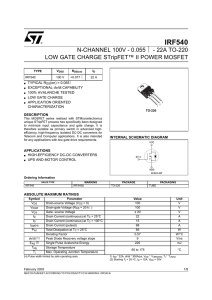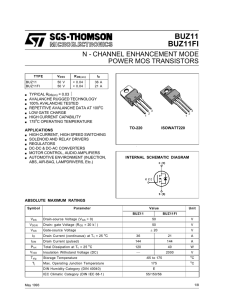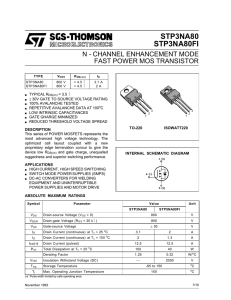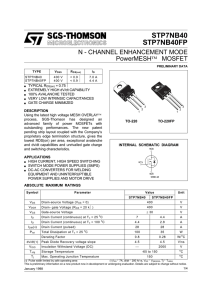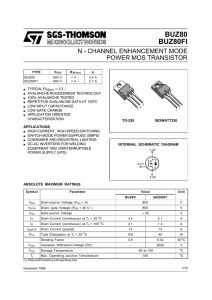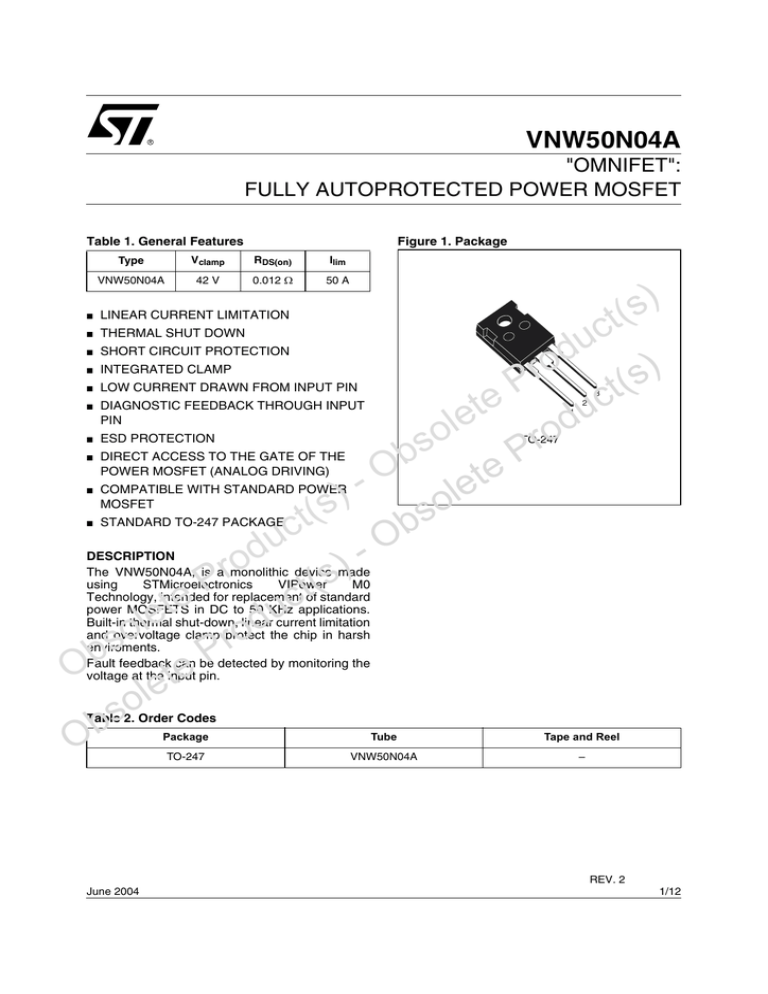
VNW50N04A
"OMNIFET":
FULLY AUTOPROTECTED POWER MOSFET
Table 1. General Features
Figure 1. Package
Type
Vclamp
RDS(on)
Ilim
VNW50N04A
42 V
0.012 Ω
50 A
)
s
(
t
c
u
d
o
)
r
s
(
P
t
c
e
t
u
e
d
l
o
o
r
s
P
b
e
O
t
e
l
)
o
s
(
s
t
b
c
u
O
d
o
)
r
s
P
(
t
c
e
t
u
e
l
d
o
o
r
s
P
b
O
e
t
e
l
o
s
b
O
■
LINEAR CURRENT LIMITATION
■
THERMAL SHUT DOWN
■
SHORT CIRCUIT PROTECTION
■
INTEGRATED CLAMP
■
LOW CURRENT DRAWN FROM INPUT PIN
■
DIAGNOSTIC FEEDBACK THROUGH INPUT
PIN
■
ESD PROTECTION
■
DIRECT ACCESS TO THE GATE OF THE
POWER MOSFET (ANALOG DRIVING)
■
COMPATIBLE WITH STANDARD POWER
MOSFET
■
STANDARD TO-247 PACKAGE
3
2
1
TO-247
DESCRIPTION
The VNW50N04A, is a monolithic device made
using
STMicroelectronics
VIPower
M0
Technology, intended for replacement of standard
power MOSFETS in DC to 50 KHz applications.
Built-in thermal shut-down, linear current limitation
and overvoltage clamp protect the chip in harsh
enviroments.
Fault feedback can be detected by monitoring the
voltage at the input pin.
Table 2. Order Codes
Package
Tube
Tape and Reel
TO-247
VNW50N04A
–
REV. 2
June 2004
1/12
VNW50N04A
Figure 2. Block Diagram
)
s
(
t
c
u
d
o
)
r
s
(
P
t
c
e
t
u
e
d
l
o
o
r
s
P
b
e
O
t
e
l
)
o
s
(
s
t
b
c
u
O
d
o
)
r
s
P
(
t
c
e
t
u
e
l
d
o
o
r
s
P
b
O
e
t
e
l
o
s
b
O
Table 3. Absolute Maximum Ratings
Symbol
Parameter
Value
Unit
Internally Clamped
V
VDS
Drain-Source Voltage (Vin = 0)
Vin
Input Voltage
18
V
ID
Drain Current
Internally Limited
A
IR
Reverse DC Output Current
–100
A
Vesd
Electrostatic Discharge (C = 100 pF, R =1.5 KΩ)
2000
V
Ptot
Total Dissipation at Tc = 25 °C
208
W
Tj
Operating Junction Temperature
Internally Limited
°C
Tc
Case Operating Temperature
Internally Limited
°C
-55 to 150
°C
Value
Unit
Tstg
Storage Temperature
Table 4. Thermal Data
Symbol
Parameter
Rthj-case
Thermal Resistance Junction-case
Max
0.6
°C/W
Rthj-amb
Thermal Resistance Junction-ambient
Max
30
°C/W
2/12
VNW50N04A
ELECTRICAL CHARACTERISTICS (Tcase = 25°C unless otherwise specified)
Table 5. Off
Symbol
Parameter
Test Conditions
Min.
Typ.
Max.
Unit
42
48
V
Drain-source Clamp Voltage
ID = 18 A; Vin = 0
36
VCLTH
Drain-source Clamp Threshold
Voltage
ID = 2 mA; Vin = 0
35
VINCL
Input-Source Reverse Clamp
Voltage
Iin = –1 mA
–1
IDSS
Zero Input Voltage
Drain Current (Vin = 0)
VDS = 13 V; Vin = 0
VDS = 25 V; Vin = 0
IISS
Supply Current from Input Pin
VDS = 0 V; Vin = 10 V
VCLAMP
V
Parameter
Test Conditions
VIN(th)
Input Threshold Voltage
VDS = Vin; ID + Iin = 1 mA
RDS(on)
Static Drain-source On
Resistance
Vin = 10 V; ID = 25 A
Vin = 5 V; ID = 25 A
Table 7. Dynamic
Parameter
gfs (2)
Forward Transconductance
Coss
Output Capacitance
u
d
o
r
P
e
Table 8. Switching
Symbol
let
tr
o
s
b
td(off)
O
tf
s
b
O
td(off)
tf
(di/dt)on
Qi
Rise Time
r
P
e
Turn-off Delay Time
50
500
µA
Max.
Unit
3
V
Test Conditions
Min.
)
s
t(
0.012
0.015
Ω
Ω
Max.
Unit
S
2000
3000
pF
Typ.
Max.
Unit
VDD = 15 V; Id = 25 A;
100
200
ns
Vgen = 10V; Rgen = 10 Ω
400
700
ns
(see Figure 27)
800
1500
ns
500
900
ns
1.8
3
µs
Fall Time
t
e
l
o
td(on)
tr
u
d
o
Turn-on Delay Time
o
s
b
O
-
35
VDS = 13 V; f = 1 MHz; Vin = 0
)
s
(
ct
Parameter
td(on)
Typ.
)
(s
µA
µA
uc
Min.
VDS = 13 V; ID = 25 A
ct
Typ.
d
o
r
P
e
let
b
O
Test Conditions
Note: 2. Pulsed: Pulse duration = 300 µs, duty cycle 1.5%.
(3)
ete
l
o
s
Note: 1. Pulsed: Pulse duration = 300 µs, duty cycle 1.5%
Symbol
0.8
50
200
c
u
d
o
r
P
Min.
V
)
s
(
t
250
Table 6. On (1)
Symbol
–0.3
Turn-on Delay Time
VDD = 15 V; Id = 25 A;
Rise Time
Vgen = 10V; Rgen = 1000 Ω
3
5
µs
Turn-off Delay Time
(see Figure 27)
18
25
µs
10
15
µs
Fall Time
Turn-on Current Slope
VDD = 15 V; ID = 25 A
Vin = 10 V; Rgen = 10 Ω
55
A/µs
Total Input Charge
VDD = 15 V; ID = 25 A; Vin = 10 V
190
nC
Note: 3. Parameters guaranteed by design/characterization.
3/12
VNW50N04A
ELECTRICAL CHARACTERISTICS (cont’d)
Table 9. Source Drain Diode
Symbol
Parameter
Test Conditions
Forward On Voltage
ISD = 25 A; Vin = 0
trr(5)
Reverse Recovery Time
Qrr(5)
Reverse Recovery Charge
ISD = 25 A; di/dt = 100 A/µs
VDD = 30 V; Tj = 25 °C
(see test circuit, Figure 29)
IRRM(5)
Reverse Recovery Current
VSD(4)
Min.
Typ.
Max.
Unit
1.6
V
800
ns
5
µC
15
A
Note: 4. Pulsed: Pulse duration = 300 µs, duty cycle 1.5%
5. Parameters guaranteed by design/characterization.
)
s
(
t
c
u
d
o
)
r
s
(
P
t
c
e
t
u
e
d
l
o
o
r
s
P
b
e
O
t
e
l
)
o
s
(
s
t
b
c
u
O
d
o
)
r
s
P
(
t
c
e
t
u
e
l
d
o
o
r
s
P
b
O
e
t
e
l
o
s
b
O
Table 10. Protection
Symbol
Parameter
Test Conditions
Min.
Typ.
Max.
Unit
35
35
50
50
65
65
A
A
50
130
80
200
µs
µs
Drain Current Limit
Vin = 10 V; VDS = 13 V
Vin = 5 V; VDS = 13 V
tdlim(6)
Step Response Current Limit
Vin = 10 V
Vin = 5 V
Tjsh(6)
Overtemperature Shutdown
150
°C
Tjrs(6)
Overtemperature Reset
135
°C
Igf(6)
Fault Sink Current
Vin = 10 V; VDS = 13 V
Vin = 5 V; VDS = 13 V
Eas(6)
Single Pulse Avalanche
Energy
starting Tj = 25 °C; VDD = 20 V
Vin = 10 V; Rgen = 1 KΩ; L = 10 mH
Ilim
50
20
4
mA
mA
J
Note: 6. Parameters guaranteed by design/characterization.
PROTECTION FEATURES
During normal operation, the Input pin is
electrically connected to the gate of the internal
power MOSFET. The device then behaves like a
standard power MOSFET and can be used as a
switch from DC to 50 KHz. The only difference
from the user’s standpoint is that a small DC
current (Iiss) flows into the Input pin in order to
supply the internal circuitry.
The device integrates:
– OVERVOLTAGE
CLAMP
PROTECTION:
internally set at 42V, along with the rugged
avalanche characteristics of the Power
MOSFET stage give this device unrivalled
ruggedness and energy handling capability.
This feature is mainly important when driving
inductive loads.
– LINEAR CURRENT LIMITER CIRCUIT: limits
the drain current Id to Ilim whatever the Input pin
voltage. When the current limiter is active, the
device operates in the linear region, so power
dissipation may exceed the capability of the
heatsink. Both case and junction temperatures
increase, and if this phase lasts long enough,
junction
temperature
may
reach
the
overtemperature threshold Tjsh.
4/12
– OVERTEMPERATURE AND SHORT CIRCUIT
PROTECTION: these are based on sensing the
chip temperature and are not dependent on the
input voltage. The location of the sensing
element on the chip in the power stage area
ensures fast, accurate detection of the junction
temperature. Overtemperature cutout occurs at
minimum 170°C. The device is automatically
restarted when the chip temperature falls below
155°C.
– STATUS FEEDBACK: In the case of an
overtemperature fault condition, a Status
Feedback is provided through the Input pin. The
internal protection circuit disconnects the input
from the gate and connects it instead to ground
via an equivalent resistance of 100 Ω. The
failure can be detected by monitoring the
voltage at the Input pin, which will be close to
ground potential.
Additional features of this device are ESD
protection according to the Human Body model
and the ability to be driven from a TTL Logic circuit
(with a small increase in RDS(on)).
VNW50N04A
Figure 3. Thermal Impedance
Figure 4. Derating Curve
)
s
(
t
c
u
d
o
)
r
s
(
P
t
c
e
t
u
e
d
l
o
o
r
s
P
b
e
O
t
e
l
)
o
s
(
s
t
b
c
u
O
d
o
)
r
s
P
(
t
c
e
t
u
e
l
d
o
o
r
s
P
b
O
e
t
e
l
o
s
b
O
Figure 5. Output Characteristics
Figure 6. Transconductance
Figure 7. Static Drain-Source On Resistance vs
Input Voltage
Figure 8. Static Drain-Source On Resistance
5/12
VNW50N04A
Figure 9. Static Drain-Source On Resistance
Figure 10. Input Charge vs Input Voltage
)
s
(
t
c
u
d
o
)
r
s
(
P
t
c
e
t
u
e
d
l
o
o
r
s
P
b
e
O
t
e
l
)
o
s
(
s
t
b
c
u
O
d
o
)
r
s
P
(
t
c
e
t
u
e
l
d
o
o
r
s
P
b
O
e
t
e
l
o
s
b
O
Figure 11. Capacitance Variations
Figure 12. Normalized Input Threshold Voltage
vs Temperature
Figure 13. Normalized On Resistance vs
Temperature
Figure 14. Normalized On Resistance vs
Temperature
6/12
VNW50N04A
Figure 15. Turn-on Current Slope
Figure 16. Turn-on Current Slope
)
s
(
t
c
u
d
o
)
r
s
(
P
t
c
e
t
u
e
d
l
o
o
r
s
P
b
e
O
t
e
l
)
o
s
(
s
t
b
c
u
O
d
o
)
r
s
P
(
t
c
e
t
u
e
l
d
o
o
r
s
P
b
O
e
t
e
l
o
s
b
O
Figure 17. Turn-off Drain-Source Voltage Slope
Figure 18. Turn-off Drain-Source Voltage Slope
Figure 19. Switching Time Resistive Load
Figure 20. Switching Time Resistive Load
7/12
VNW50N04A
Figure 21. Switching Time Resistive Load
Figure 22. Current Limit vs Junction
Temperature
)
s
(
t
c
u
d
o
)
r
s
(
P
t
c
e
t
u
e
d
l
o
o
r
s
P
b
e
O
t
e
l
)
o
s
(
s
t
b
c
u
O
d
o
)
r
s
P
(
t
c
e
t
u
e
l
d
o
o
r
s
P
b
O
e
t
e
l
o
s
b
O
Figure 23. Step Response Current Limit
8/12
Figure 24. Source Drain Diode Forward
Characteristics
VNW50N04A
Figure 25. Unclamped Inductive Load Test
Circuits
Figure 26. Unclamped Inductive Waveforms
)
s
(
t
c
u
d
o
)
r
s
(
P
t
c
e
t
u
e
d
l
o
o
r
s
P
b
e
O
t
e
l
)
o
s
(
s
t
b
c
u
O
d
o
)
r
s
P
(
t
c
e
t
u
e
l
d
o
o
r
s
P
b
O
e
t
e
l
o
s
b
O
Figure 27. Switching Times Test Circuits For
Resistive Load
Figure 28. Input Charge Test Circuit
Figure 29. Test Circuit For Inductive Load
Switching And Diode Recovery Times
Figure 30. Waveforms
9/12
VNW50N04A
PACKAGE MECHANICAL
Table 11. TO-247 Mechanical Data
Symbol
millimeters
Min
Typ
Max
A
4.85
5.15
A1
2.20
2.60
b
1.0
1.40
b1
2.0
2.40
b2
3.0
3.40
)
s
(
t
c
u
d
o
)
r
s
(
P
t
c
e
t
u
e
d
l
o
o
r
s
P
b
e
O
t
e
l
)
o
s
(
s
t
b
c
u
O
d
o
)
r
s
P
(
t
c
e
t
u
e
l
d
o
o
r
s
P
b
O
e
t
e
l
o
s
b
O
c
0.40
0.80
D
19.85
20.15
E
15.45
e
15.75
5.45
L
14.20
14.80
L1
3.70
4.30
L2
18.50
∅P
3.55
3.65
∅R
4.50
5.50
S
5.50
Package Weight
Gr. 4.43
Figure 31. TO-247 Package Dimensions
P025P
Note: Drawing is not to scale.
10/12
VNW50N04A
REVISION HISTORY
Table 12. Revision History
Date
Revision
Description of Changes
February-1998
1
First Issue
18-June-2004
2
Stylesheet update. No content change.
)
s
(
t
c
u
d
o
)
r
s
(
P
t
c
e
t
u
e
d
l
o
o
r
s
P
b
e
O
t
e
l
)
o
s
(
s
t
b
c
u
O
d
o
)
r
s
P
(
t
c
e
t
u
e
l
d
o
o
r
s
P
b
O
e
t
e
l
o
s
b
O
11/12
VNW50N04A
)
s
(
t
c
u
d
o
)
r
s
(
P
t
c
e
t
u
e
d
l
o
o
r
s
P
b
e
O
t
e
l
)
o
s
(
s
t
b
c
u
O
d
o
)
r
s
P
(
t
c
e
t
u
e
l
d
o
o
r
s
P
b
O
e
t
e
l
o
s
b
O
Information furnished is believed to be accurate and reliable. However, STMicroelectronics assumes no responsibility for the consequences
of use of such information nor for any infringement of patents or other rights of third parties which may result from its use. No license is granted
by implication or otherwise under any patent or patent rights of STMicroelectronics. Specifications mentioned in this publication are subject
to change without notice. This publication supersedes and replaces all information previously supplied. STMicroelectronics products are not
authorized for use as critical components in life support devices or systems without express written approval of STMicroelectronics.
The ST logo is a registered trademark of STMicroelectronics.
All other names are the property of their respective owners
© 2004 STMicroelectronics - All rights reserved
STMicroelectronics GROUP OF COMPANIES
Australia - Belgium - Brazil - Canada - China - Czech Republic - Finland - France - Germany - Hong Kong - India - Israel - Italy - Japan Malaysia - Malta - Morocco - Singapore - Spain - Sweden - Switzerland - United Kingdom - United States
www.st.com
12/12

